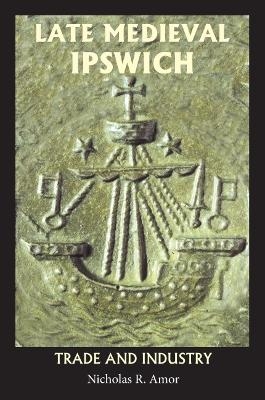
Late Medieval Ipswich
Trade and Industry
Seiten
2011
The Boydell Press (Verlag)
978-1-84383-673-5 (ISBN)
The Boydell Press (Verlag)
978-1-84383-673-5 (ISBN)
A detailed study of Ipswich at a time of great growth and prosperity, highlighting the activities of its industries, merchants and craftsmen.
Ipswich in the late Middle Ages was a flourishing town. A wide range of commodities passed through its port, to and from far-flung markets, bought and sold by merchants from diverse backgrounds, and carried in ships whose design evolved during the fourteenth and fifteenth centuries. Its trading partners, both domestic and overseas, changed in response to developments in the international, national and local economy, as did the occupations of its craftsmen,with textile, leather and metal industries were of particular importance. However, despite its importance, and the richness of its medieval archives, the story of Ipswich at the time has been sadly neglected. This is a gap whichthe author here aims to remedy. His careful study allows a detailed picture of urban life to emerge, shedding new light not only on the borough itself, but on towns more generally at a crucial point in their development, at a period of growing affluence when ordinary people enjoyed an unprecedented rise in standards of living, and the benefits of what might be termed our first consumer revolution.
Nicholas Amor gained his doctorate from the University of East Anglia.
Ipswich in the late Middle Ages was a flourishing town. A wide range of commodities passed through its port, to and from far-flung markets, bought and sold by merchants from diverse backgrounds, and carried in ships whose design evolved during the fourteenth and fifteenth centuries. Its trading partners, both domestic and overseas, changed in response to developments in the international, national and local economy, as did the occupations of its craftsmen,with textile, leather and metal industries were of particular importance. However, despite its importance, and the richness of its medieval archives, the story of Ipswich at the time has been sadly neglected. This is a gap whichthe author here aims to remedy. His careful study allows a detailed picture of urban life to emerge, shedding new light not only on the borough itself, but on towns more generally at a crucial point in their development, at a period of growing affluence when ordinary people enjoyed an unprecedented rise in standards of living, and the benefits of what might be termed our first consumer revolution.
Nicholas Amor gained his doctorate from the University of East Anglia.
NICHOLAS R. AMOR gained his doctorate from the University of East Anglia.
Introduction
Economic Context
The Produce of Many Lands
A Flourishing Town
Merchants of Cologne
The Town in Troubled Times
Calmer Waters
Recovery Begins
Inventiveness and Enterprise
Appendix 1: Timeline
Appendix 2: Fifteenth-century Ipswich Bailiffs
Appendix 3: Fifteenth-century Ipswich People
Appendix 4: Surviving Memorials to Ipswich Burgesses
Appendix 5: Merchants Shipping Wool from Ipswich, 1396-1413
Appendix 6: Exports and Imports by Ipswich Merchants, 1396-98
Appendix 7: Denizen Merchants Active in Ipswich Overseas Trade, 1459-66
Bibliography
| Erscheint lt. Verlag | 20.10.2011 |
|---|---|
| Zusatzinfo | 6 line and 6 b/w illus. |
| Verlagsort | Woodbridge |
| Sprache | englisch |
| Maße | 156 x 234 mm |
| Gewicht | 702 g |
| Themenwelt | Geschichte ► Allgemeine Geschichte ► Mittelalter |
| Geisteswissenschaften ► Geschichte ► Regional- / Ländergeschichte | |
| Geschichte ► Teilgebiete der Geschichte ► Wirtschaftsgeschichte | |
| ISBN-10 | 1-84383-673-4 / 1843836734 |
| ISBN-13 | 978-1-84383-673-5 / 9781843836735 |
| Zustand | Neuware |
| Haben Sie eine Frage zum Produkt? |
Mehr entdecken
aus dem Bereich
aus dem Bereich
eine neue Geschichte des Mittelalters
Buch | Hardcover (2023)
C.H.Beck (Verlag)
CHF 53,20


